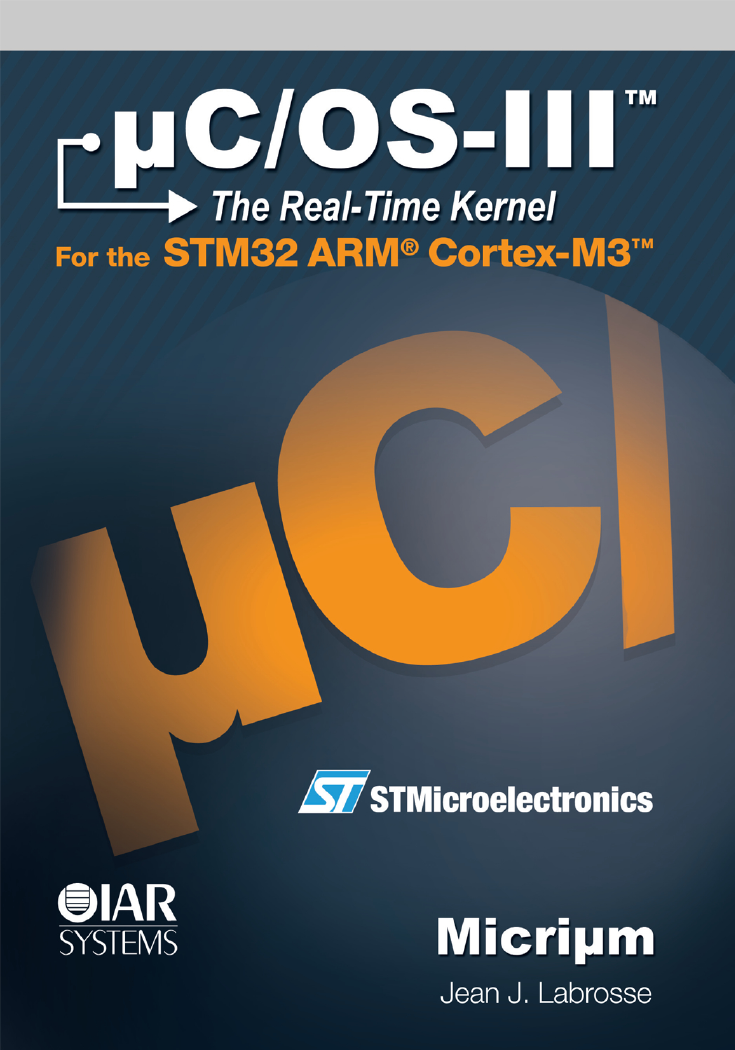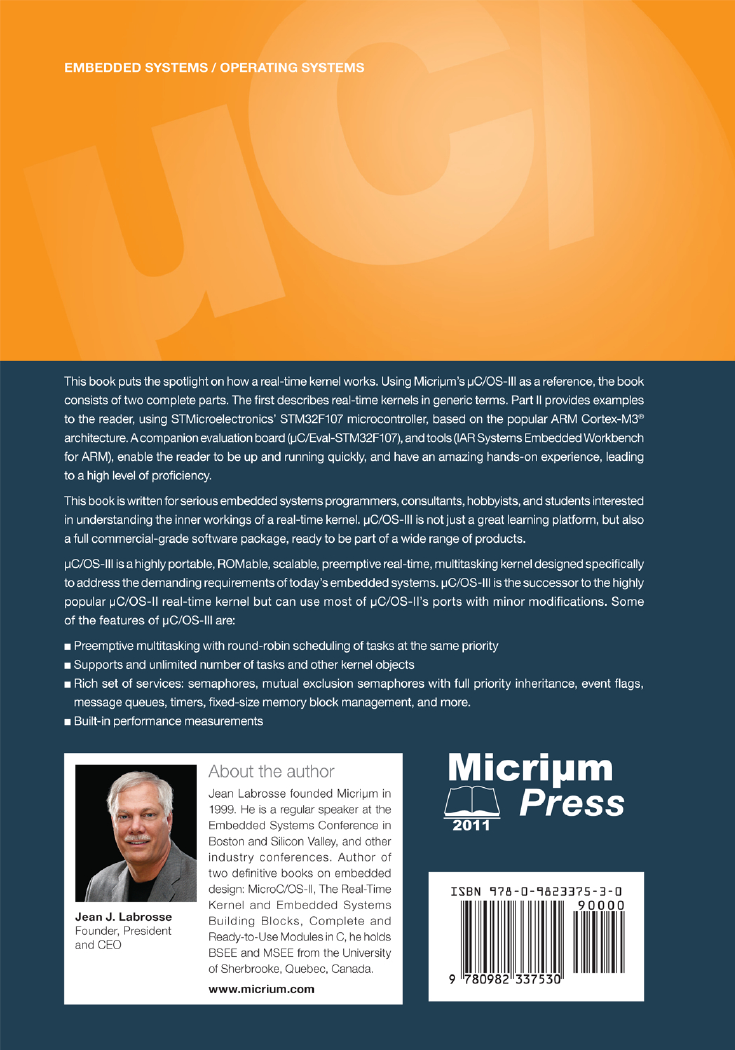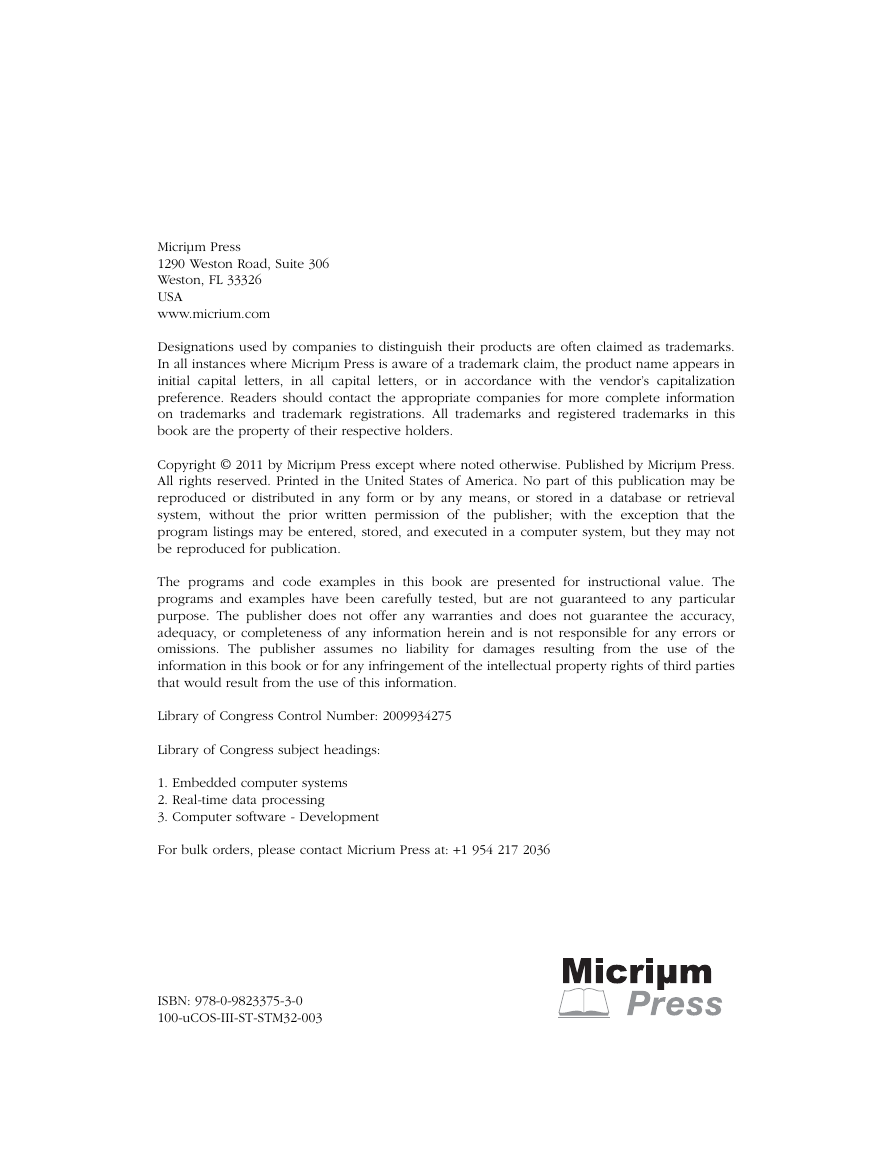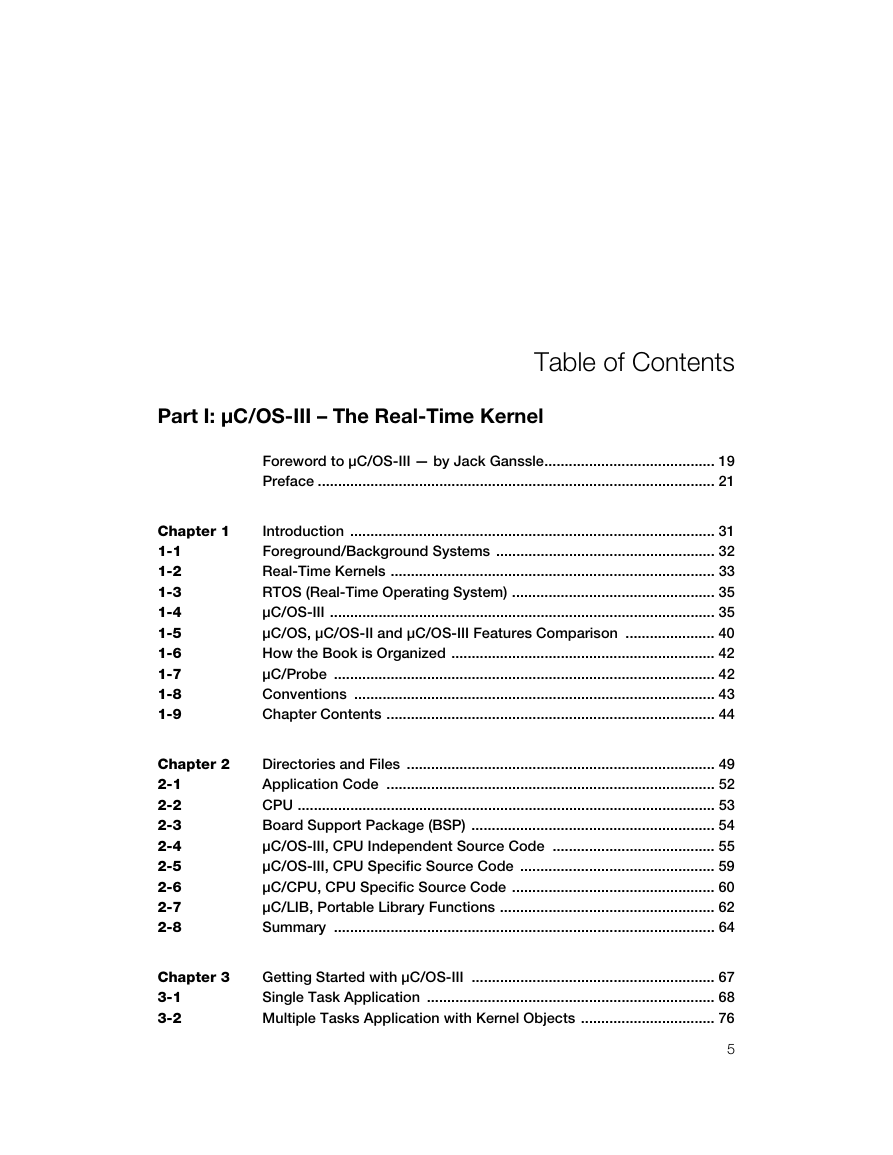Cover
Table of Contents
Part I
Foreword to µC/OS-III — by Jack Ganssle
Preface
Introduction
1-1 Foreground/Background Systems
1-2 Real-Time Kernels
1-3 RTOS (Real-Time Operating System)
1-4 µC/OS-III
1-5 µC/OS, µC/OS-II and µC/OS-III Features Comparison
1-6 How the Book is Organized
1-7 µC/Probe
1-8 Conventions
1-9 Chapter Contents
Directories and Files
2-1 Application Code
2-2 CPU
2-3 Board Support Package (BSP)
2-4 µC/OS-III, CPU Independent Source Code
2-5 µC/OS-III, CPU Specific Source Code
2-6 µC/CPU, CPU Specific Source Code
2-7 µC/LIB, Portable Library Functions
2-8 Summary
Getting Started with µC/OS-III
3-1 Single Task Application
3-2 Multiple Tasks Application with Kernel Objects
Critical Sections
4-1 Disabling Interrupts
4-1-1 Measuring Interrupt Disable Time
4-2 Locking the Scheduler
4-2-1 Measuring Scheduler Lock Time
4-3 µC/OS-III Features with Longer Critical Sections
4-4 Summary
Task Management
5-1 Assigning Task Priorities
5-2 Determining the Size of a Stack
5-3 Detecting Task Stack Overflows
5-4 Task Management Services
5-5 Task Management Internals
5-5-1 Task States
5-5-2 Task Control Blocks (TCBs)
5-6 Internal Tasks
5-6-1 The Idle Task (OS_IdleTask(), os_core.c)
5-6-2 The Tick Task (OS_TickTask(), os_tick.c)
5-6-3 The Statistic Task (OS_StatTask(), os_stat.c)
5-6-4 The Timer Task (OS_TmrTask(), os_tmr.c)
5-6-5 The ISR Handler Task (OS_IntQTask(), os_int.c)
5-7 Summary
The Ready List
6-1 Priority Levels
6-2 The Ready List
6-3 Adding Tasks to the Ready List
6-4 Summary
Scheduling
7-1 Preemptive Scheduling
7-2 Scheduling Points
7-3 Round-Robin Scheduling
7-4 Scheduling Internals
7-4-1 OSSched()
7-4-2 OSIntExit()
7-4-3 OS_SchedRoundRobin()
7-5 Summary
Context Switching
8-1 OSCtxSw()
8-2 OSIntCtxSw()
8-3 Summary
Interrupt Management
9-1 Handling CPU Interrupts
9-2 Typical µC/OS-III Interrupt Service Routine (ISR)
9-3 Non Kernel-Aware Interrupt Service Routine (ISR)
9-4 Processors with Multiple Interrupt Priorities
9-5 All Interrupts Vector to a Common Location
9-6 Every Interrupt Vectors to a Unique Location
9-7 Direct and Deferred Post Methods
9-7-1 Direct Post Method
9-7-2 Deferred Post Method
9-8 Direct vs. Deferred Post Method
9-9 The Clock Tick (or System Tick)
9-10 Summary
Pend Lists (or Wait Lists)
10-1 Summary
Time Management
11-1 OSTimeDly()
11-2 OSTimeDlyHMSM()
11-3 OSTimeDlyResume()
11-4 OSTimeSet() and OSTimeGet()
11-5 OSTimeTick()
11-6 Summary
Timer Management
12-1 One-Shot Timers
12-2 Periodic (no initial delay)
12-3 Periodic (with initial delay)
12-4 Timer Management Internals
12-4-1 Timer Management Internals - Timers States
12-4-2 Timer Management Internals - OS_TMR
12-4-3 Timer Management Internals - Timer Task
12-4-4 Timer Management Internals - Timer List
12-5 Summary
Resource Management
13-1 Disable/Enable Interrupts
13-2 Lock/Unlock
13-3 Semaphores
13-3-1 Binary Semaphores
13-3-2 Counting Semaphores
13-3-3 Notes on Semaphores
13-3-4 Semaphore Internals (for resource sharing)
13-3-5 Priority Inversions
13-4 Mutual Exclusion Semaphores (Mutex)
13-4-1 Mutual Exclusion Semaphore Internals
13-5 Should You Use a Semaphore Instead of a Mutex?
13-6 Deadlocks (or Deadly Embrace)
13-7 Summary
Synchronization
14-1 Semaphores
14-1-1 Unilateral Rendez-vous
14-1-2 Credit Tracking
14-1-3 Multiple Tasks Waiting on a Semaphore
14-1-4 Semaphore Internals (for synchronization)
14-2 Task Semaphore
14-2-1 Pending (i.e., Waiting) on a Task Semaphore
14-2-2 Posting (i.e., Signaling) a Task Semaphore
14-2-3 Bilateral Rendez-vous
14-3 Event Flags
14-3-1 Using Event Flags
14-3-2 Event Flags Internals
14-4 Synchronizing Multiple Tasks
14-5 Summary
Message Passing
15-1 Messages
15-2 Message Queues
15-3 Task Message Queue
15-4 Bilateral Rendez-vous
15-5 Flow Control
15-6 Keeping the Data in Scope
15-7 Using Message Queues
15-8 Clients and Servers
15-9 Message Queues Internals
15-10 Summary
Pending On Multiple Objects
16-1 Summary
Memory Management
17-1 Creating a Memory Partition
17-2 Getting a Memory Block from a Partition
17-3 Returning a Memory Block to a Partition
17-4 Using Memory Partitions
17-5 Summary
Porting µC/OS-III
18-1 Conventions
18-2 µC/CPU
18-2-1 cpu_bsp.h
18-2-2 cpu_def.h
18-2-3 cpu_cfg.h
18-2-4 cpu_core.c
18-2-5 cpu_core.h
18-2-6 cpu.h
18-2-7 cpu_c.c
18-2-8 cpu_a.asm
18-3 µC/OS-III Port
18-3-1 os_cpu.h
18-3-2 os_cpu_c.c
18-3-3 os_cpu_a.asm
18-3-4 os_cpu_a.inc
18-4 Board Support Package (BSP)
18-4-1 bsp.c and bsp.h
18-4-2 bsp_int.c and bsp_int.h
18-5 Testing a Port
18-5-1 Creating a Simple Test Project
18-5-2 Verifying Task Context Switches
18-5-3 Verifying Interrupt Context Switches
18-6 Summary
Run-Time Statistics
19-1 General Statistics – Run-Time
19-2 Per-Task Statistics – Run-Time
19-3 Kernel Object – Run-Time
19-4 os_dbg.c – Static
19-5 os_cfg_app.c – Static
19-6 Summary
µC/OS-III API Reference
A-1 Task Management
A-2 Time Management
A-3 Mutual Exclusion Semaphores – Resource Management
A-4 Event Flags – Synchronization
A-5 Semaphores – Synchronization
A-6 Task Semaphores – Synchronization
A-7 Message Queues – Message Passing
A-8 Task Message Queues – Message Passing
A-9 Pending on Multiple Objects
A-10 Timers
A-11 Fixed-Size Memory Partitions – Memory Management
A-12 OSCtxSw()
A-13 OSFlagCreate()
A-14 OSFlagDel()
A-15 OSFlagPend()
A-16 OSFlagPendAbort()
A-17 OSFlagPendGetFlagsRdy()
A-18 OSFlagPost()
A-19 OSIdleTaskHook()
A-20 OSInit()
A-21 OSInitHook()
A-22 OSIntCtxSw()
A-23 OSIntEnter()
A-24 OSIntExit()
A-25 OSMemCreate()
A-26 OSMemGet()
A-27 OSMemPut()
A-28 OSMutexCreate()
A-29 OSMutexDel()
A-30 OSMutexPend()
A-31 OSMutexPendAbort()
A-32 OSMutexPost()
A-33 OSPendMulti()
A-34 OSQCreate()
A-35 OSQDel()
A-36 OSQFlush()
A-37 OSQPend()
A-38 OSQPendAbort()
A-39 OSQPost()
A-40 OSSafetyCriticalStart()
A-41 OSSched()
A-42 OSSchedLock()
A-43 OSSchedRoundRobinCfg()
A-44 OSSchedRoundRobinYield()
A-45 OSSchedUnlock()
A-46 OSSemCreate()
A-47 OSSemDel()
A-48 OSSemPend()
A-49 OSSemPendAbort()
A-50 OSSemPost()
A-51 OSSemSet()
A-52 OSStart()
A-53 OSStartHighRdy()
A-54 OSStatReset()
A-55 OSStatTaskCPUUsageInit()
A-56 OSStatTaskHook()
A-57 OSTaskChangePrio()
A-58 OSTaskCreate()
A-59 OSTaskCreateHook()
A-60 OSTaskDel()
A-61 OSTaskDelHook()
A-62 OSTaskQFlush()
A-63 OSTaskQPend()
A-64 OSTaskQPendAbort()
A-65 OSTaskQPost()
A-66 OSTaskRegGet()
A-67 OSTaskRegSet()
A-68 OSTaskReturnHook()
A-69 OSTaskResume()
A-70 OSTaskSemPend()
A-71 OSTaskSemPendAbort()
A-72 OSTaskSemPost()
A-73 OSTaskSemSet()
A-74 OSStatTaskHook()
A-75 OSTaskStkChk()
A-76 OSTaskStkInit()
A-77 OSTaskSuspend()
A-78 OSTaskSwHook()
A-79 OSTaskTimeQuantaSet()
A-80 OSTickISR()
A-81 OSTimeDly()
A-82 OSTimeDlyHMSM()
A-83 OSTimeDlyResume()
A-84 OSTimeGet()
A-85 OSTimeSet()
A-86 OSTimeTick()
A-87 OSTimeTickHook()
A-88 OSTmrCreate()
A-89 OSTmrDel()
A-90 OSTmrRemainGet()
A-91 OSTmrStart()
A-92 OSTmrStateGet()
A-93 OSTmrStop()
A-94 OSVersion()
µC/OS-III Configuration Manual
B-1 µC/OS-III Features (os_cfg.h)
B-2 Data Types (os_type.h)
B-3 µC/OS-III Stacks, Pools and other (os_cfg_app.h)
Migrating from µC/OS-II to µC/OS-III
C-1 Differences in Source File Names and Contents
C-2 Convention Changes
C-3 Variable Name Changes
C-4 API Changes
C-4-1 Event Flags
C-4-2 Message Mailboxes
C-4-3 Memory Management
C-4-4 Mutual Exclusion Semaphores
C-4-5 Message Queues
C-4-6 Semaphores
C-4-7 Task Management
C-4-8 Time Management
C-4-9 Timer Management
C-4-10 Miscellaneous
C-4-11 Hooks and Port
MISRA-C:2004 and µC/OS-III
D-1 MISRA-C:2004, Rule 8.5 (Required)
D-2 MISRA-C:2004, Rule 8.12 (Required)
D-3 MISRA-C:2004, Rule 14.7 (Required)
D-4 MISRA-C:2004, Rule 15.2 (Required)
D-5 MISRA-C:2004, Rule 17.4 (Required)
Bibliography
Licensing Policy
Part II
Introduction
1-1 The MicriUm µC/Eval-STM32F107
1-2 Part II Chapter Contents
1-3 Acknowledgements
The ARM Cortex-M3 and the STM32
2-1 The Cortex CPU
2-1-1 The Program Status Register
2-1-2 Stacking and Interrupts
2-2 Nested Vector Interrupt Controller (NVIC)
2-3 Exception Vector Table
2-4 SYSTICK (System Tick)
2-5 Memory Map
2-6 Instruction Set
2-7 Debugging Features
2-8 The STmicroelectronics STM32
Setup
3-1 Downloading µC/OS-III projects for this book
3-1-1 \EvalBoards
3-1-2 \uC-CPU
3-1-3 \uC-LIB
3-1-4 \uCOS-III
3-2 Downloading µC/Probe
3-3 Downloading the IAR Embedded Workbench for ARM
3-4 Downloading the STM32F107 documentation
µC/OS-III Example #1
4-1 Running the Project
4-2 How the example project works
4-3 Monitoring variables using µC/Probe
4-4 Summary
µC/OS-III Example #2
5-1 Running the Project
5-2 Monitoring the temperature sensor using µC/Probe
µC/OS-III Example #3
6-1 Running the Project
6-2 Examining Performance Test Results with µC/Probe
6-3 How the test code works
6-4 Other performance measurements
6-5 Summary
µC/OS-III Example #4
7-1 Running the Project
7-2 Displaying Rotating Wheel Data
7-3 RPM Measurement simulation implementation
7-3-1 Measuring RPM using an Input Capture
7-4 How the code works
7-5 Observations
7-6 Summary
µC/OS-III port for the Cortex-M3
A-1 os_cpu.h
A-2 os_cpu_c.c
A-2-1 os_cpu_c.c – OSIdleTaskHook()
A-2-2 os_cpu_c.c – OSInitHook()
A-2-3 os_cpu_c.c – OSStatTaskHook()
A-2-4 os_cpu_c.c – OSTaskCreateHook()
A-2-5 os_cpu_c.c – OSTaskDelHook()
A-2-6 os_cpu_c.c – OSTaskReturnHook()
A-2-7 os_cpu_c.c – OSTaskStkInit()
A-2-8 os_cpu_c.c – OSTaskSwHook()
A-2-9 os_cpu_c.c – OSTimeTickHook()
A-2-10 os_cpu_c.c – OS_CPU_SysTickHandler()
A-2-11 os_cpu_c.c – OS_CPU_SysTickInit()
A-3 os_cpu_a.asm
A-3-1 os_cpu_a.asm – OSStartHighRdy()
A-3-2 os_cpu_a.asm – OSCtxSw() and OSIntCtxSw()
A-3-3 os_cpu_a.asm – OS_CPU_PendSVHandler()
µC/CPU port for the Cortex-M3
B-1 cpu_core.c
B-2 cpu_core.h
B-3 cpu_def.h
B-4 cpu_cfg.h
B-5 µC/CPU Functions in bsp.c
B-5-1 µC/CPU Functions in bsp.c, CPU_TS_TmrInit()
B-5-2 µC/CPU Functions in bsp.c, CPU_TS_TmrRd()
B-6 cpu.h
B-6-1 cpu.h – #defines
B-6-2 cpu.h – Data Types
B-6-3 cpu.h – Function Prototypes
B-7 cpu_a.asm
IAR Systems IAR Embedded Workbench for ARM
C-1 IAR Embedded Workbench for ARM – Highlights
C-2 Modular and extensible IDE
C-3 Highly optimizing C/C++ Compiler
C-4 Device Support
C-5 State-of-the-art C-SPY® Debugger
C-6 C-SPY Debugger and target system support
C-7 IAR Assembler
C-8 IAR J-LINK Linker
C-9 IAR Library and library tools
C-10 Comprehensive documentation
C-11 First class technical support
Micriµm’s µC/Probe
D-1 µC/Probe is a Windows™-based application
D-2 Assigning a variable to an object
µC/Eval-STM32F107 User’s Guide
E-1 Features
E-2 Hardware layout and configuration
E-3 Power Supply
E-4 Boot Options
E-5 Reset Sources
E-6 CAN (Controller Area Network)
E-7 RS-232C
E-8 SD/MMC card
E-9 USB-OTG (USB On-The-Go)
E-10 LM75 Temperature Sensor
E-11 Debug Interface
E-12 Ethernet
E-13 Clock SourceS
E-14 Connectors
E-14-1 Extension connector (CN3)
E-14-2 Power connectors (CN1 & CN9)
E-14-3 RS-232C connectors (CN7)
E-15 I/O Assignments
E-16 Schematics
Bibliography
Licensing Policy
Index















